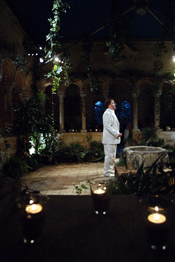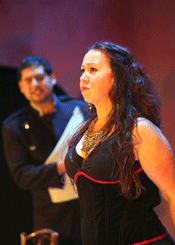They were stylistically very different and with the latter the
German-born composer threw caution to the winds both musically and
dramatically.
It was a bad call at the time as Serse flopped completely. The trouble was
that he dared to change a tried and tested formula: the wholly serious, or
tragic, seria format was infiltrated by comic or buffo
elements; he mixed characters of both high and low class within the drama, and
he even tinkered with the classic A-B-A da capo form of the arias. In
Serse much of the vocal music is in arioso form, which drives
the action forward more than the traditional, more musically complex da
capo format. All this was too much for London audiences at the time and
Handel lost money and soon after abandoned opera for the oratorio form. Luckily
for us, today we can appreciate his innovations and revel in them — as
indeed did the audience at Iford Opera in Wiltshire last Friday night.
 Andrew Radley as Arsamene [Photo courtesy of Iford Opera]
Andrew Radley as Arsamene [Photo courtesy of Iford Opera]
Once again, Iford Arts is to be congratulated for rising so magnificently
above the apparent limitations of its charming venue — one could indeed
argue that those very limitations of size and accessibility produce something
special time and again and last night was no exception. Iford encourages young
talent and in its regular offerings of Handel masterpieces in intimate
surroundings it also encourages the singers to concentrate on expression and
colour, as they do not need to worry about pushing their voices.
The usual convoluted Handel plot of misplaced affections, thwarted plans,
ladies (and men) in disguise and the triumph of love and duty (in varying
degrees) was efficiently translated into the tiny, greenery-draped colonnaded
space that is the delightful Iford Cloister by director David Freeman. Although
advertised as “Serse”, the opera was given in English and this
“Xerxes” was a translation/edit by Andrew Jones which revived
memories of the famous Hytner production of the 1980’s in its language,
if not its staging. The lively score, regretfully drastically abridged, was
offered in spicy miniature by the well-regarded players of La Nuova
Musica directed from the harpsicord by David Bates who encouraged some
really meaty, full-blooded playing from his 10 piece ensemble. In Acts I and II
the cast were somewhat depressingly attired in budget-store casuals with a bit
of sequin tat here and there to suggest royalty (one felt particularly for the
female singers who suffered very unflattering wardrobes — surely at odds
with the story?) but come Act III things improved a little. A few pyrotechnics,
many tiny candles, and a clever exploding model bridge (to take King Xerxes
across the Hellespont into Greece) made the most of the tiny stage area.
 Kristin Finnigan [Photo by and courtesy of Ralph Ripley]
Kristin Finnigan [Photo by and courtesy of Ralph Ripley]
More importantly, there was much to admire vocally with some excellent
singing from the young cast, many of whom are at the beginning of their careers
yet showed remarkable histrionic as well as musical abilities in this most
demanding of genres. There was no one outstanding performer, but we left with
perhaps three strong memories: the exciting contralto voice of young Kristin
Finnigan (Amastre) which promises to help revive the great tradition of this
most English of voice types, the impressive comic timing and agile baritone of
William Townend (Elviro) and the expressive warm-toned countertenor of Andrew
Radley (Arsamene). Verity Parker impressed with some spot-on high coloratura as
Romilda whilst also singing with some nice supple tone. She was contrasted
effectively with Kristy Swift in the soubrette role of Atalanta who
brought out the foxiness of this character with some sparkling high notes and
agile phrasing. Rather unusually, this production gave the title role to a
countertenor, the more experienced William Purefoy. These days, it’s more
often a mezzo soprano role (although written by Handel for a soprano
castrato of great renown, Caffarelli) but here at Iford the tiny stage
and proximity of the audience enables the less powerful countertenor voice to
take it on. Purefoy coped well enough with the high tessitura of this
demanding role, if not convincing us dramatically. His was no dangerously
vindictive King but rather a placid, slightly academic, royal. This was
particularly so in the scenes with his stage brother Prince Arsamenes, when
Radley acted for both of them. Purefoy is certainly a good singer (his
“rage” aria, Crudie furie in Act III was efficiently
despatched despite its huge demands on the singer) but rather miscast here.
The role of the bluff, if dim, General Ariodate was robustly taken by
baritone Jonathan Brown who made much of his limited role whilst contralto
Kristin Finnigan was forced to do the same. How one longed to hear more of
Amastre’s music and less of her creeping around the cloister, forever
listening to the plotting of others’ loves. Finnigan might just be
something special in the making — directors take note.
Cutting Handel is a fact of life — unpleasant but sometimes necessary
— but for this writer there were just too many “cuts too
far”. So many important, and lovely, arias went unheard. Everyone comes
to Iford by car (there is no evening public transport in this idyllic rural
location) so why not revel in more of Handel’s sublime music and get home
half an hour later? After all, another thirty minutes in this beautiful place,
with music of this quality, is hardly an imposition.
© Sue Loder 2010
Serse, by G.F. Handel continues on the 13th, 14th, 16th and 17th
July at Iford, near Bradford on Avon, Wiltshire, U.K. More information: www.ifordarts.co.uk


